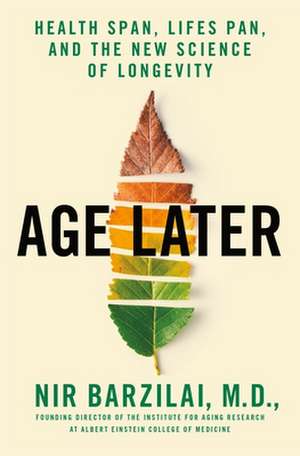Age Later
Autor Nir Barzilaien Limba Engleză Hardback – 16 iun 2020
Founder of the Institute for Aging Research at the Albert Einstein College of Medicine and one of the leading pioneers of longevity research, Dr. Nir Barzilai's life's work is tackling the challenges of aging to delay and prevent the onset of all age-related diseases including "the big four" diabetes, cancer, heart disease, and Alzheimer's.
One of Dr. Barzilai's most fascinating studies features volunteers that include 750 SuperAgers--individuals who maintain active lives well into their nineties and even beyond--and, more importantly, who reached that ripe old age never having experienced cardiovascular disease, cancer, diabetes, or cognitive decline.
In Age Later, Dr. Barzilai reveals the secrets his team has unlocked about SuperAgers and the scientific discoveries that show we can mimic some of their natural resistance to the aging process. This eye-opening and inspirational book will help you think of aging not as a certainty, but as a phenomenon--like many other diseases and misfortunes--that can be targeted, improved, and even cured.
Preț: 155.75 lei
Nou
Puncte Express: 234
Preț estimativ în valută:
29.81€ • 30.96$ • 24.76£
29.81€ • 30.96$ • 24.76£
Carte disponibilă
Livrare economică 13-27 ianuarie 25
Preluare comenzi: 021 569.72.76
Specificații
ISBN-13: 9781250230850
ISBN-10: 1250230853
Pagini: 288
Dimensiuni: 161 x 241 x 27 mm
Greutate: 0.47 kg
Editura: St. Martin's Publishing Group
ISBN-10: 1250230853
Pagini: 288
Dimensiuni: 161 x 241 x 27 mm
Greutate: 0.47 kg
Editura: St. Martin's Publishing Group
Descriere
Healthspan Lifespan and the New Science of Longevity. Nir Barzlai, M.D., founded the Institute for Aging Research at the Albert Einstein College of Medicine over twenty years ago. His most fascinating study features a patient population of 600 centenarians - individuals who maintain active lives well into their 90s and 100s - and, more importantly, reached that milestone never having experienced the so-called big four cardiovascular disease, cancer, diabetes and cognitive decline. Dr. Barzlai identified three clusters of genetic mutations - connected to levels of cholesterol, growth hormones and peptides produced in their cells mitochondria - that
